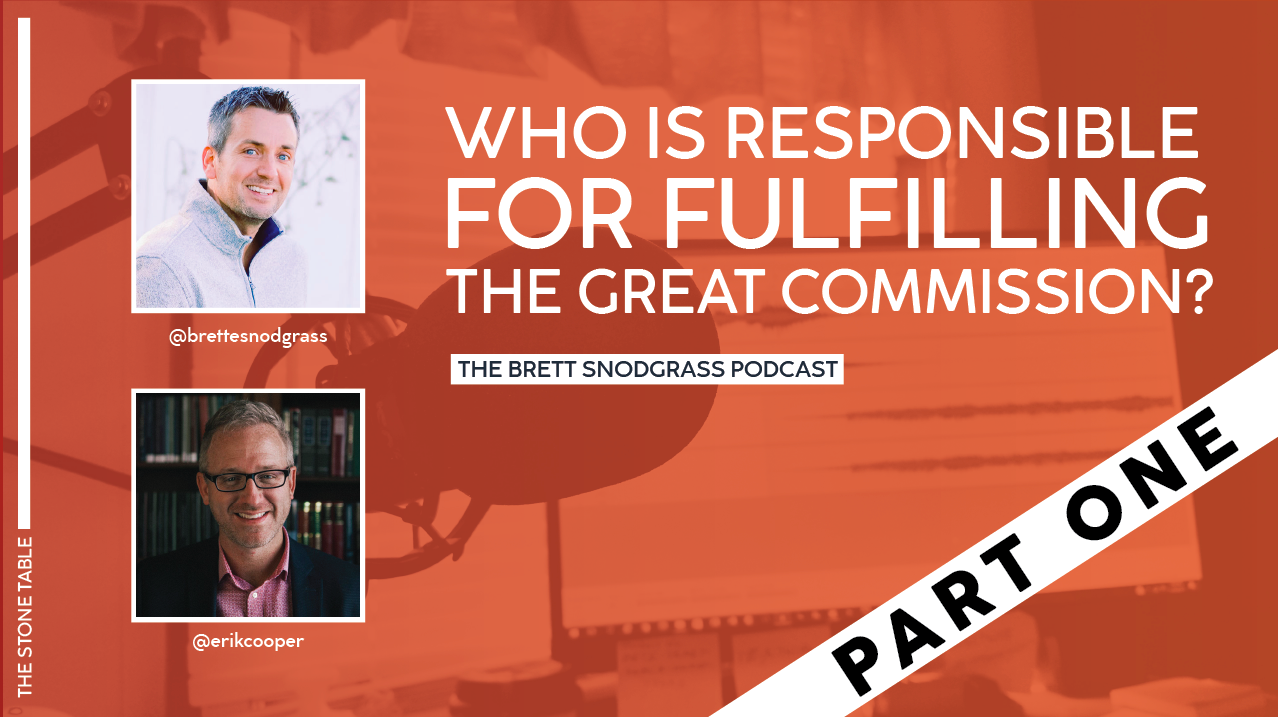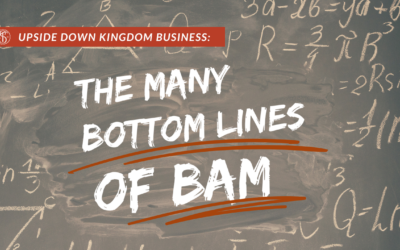We’re back with Part 1 of The Brett Snodgrass Podcast featuring Erik Cooper. This segment is focusing on the responsibility of a work-life balance. Check it out and click here to view Part 2.
Transcript
Brett Snodgrass: So, talk about this, you are surrounded by business owners and entrepreneurs with money, like I would imagine that you are surrounded with people that have wealth. You have investors for you and your company, and you talk into people’s lives that have wealth and money so let’s talk about that because I’m sure that’s a topic. I think you’ve written blogs about it and articles about wealth, riches, money, and the Kingdom of Heaven. So, talk to us about that and the balance of that and the struggles of that because you know people would say, well, you know the wealthier you are, it makes it harder for you to enter the Kingdom, right? So, talk about that…
Erik Cooper: Well, yeah, I think Jesus said that and I do think there’s some reality to that to some extent. Although, you know, I don’t think money is inherently a bad thing. You know, I know a lot of wealthy people who deal with that, but it is a burden. I think sometimes I think it can be a burden. And I guess, you know, if you look historically; I’m reading through the book of Deuteronomy right now, and if you look at the Israelites when they came out of Egypt what God wanted from them and what they constantly screwed up and what we constantly screw up is God wanted their trust and their dependence on him. Because when we are under that covering, when we’re dependent on Christ, when we’re dependent on our Creator, we are actually functioning in our design, as God designed us and I think anything wealth or we can make idols of anything you know. We look at the Israelites and they you know have God’s literal presence in their midst, and they melt down all their jewelry and make a golden calf and bow down and worship and we think that what kind of morons are these people. And then God knows that like you do that every day, right? You know. And so, I think we are capable of making idols out of anything and money is obviously one of those things that we can easily.
Well, we can trade in our dependence on God for our ability to just solve our own problems and figure out our you know, our own issues or by our way out of things. And so, I think that’s something that we all have to be cognizant of. It’s a human issue, it’s not a wealth issue and I’ve seen people with tens of millions of dollars do that very well and I’ve seen people with smaller amounts of money become dependent on it, right? And so, I think we just have to be cognizant of the human heart’s ability to fashion idols out of anything and bow down and worship them. So, I do think it’s a special challenge for, you know, extremely wealthy people not to become dependent on their wealth or not to lean back into their wealth. And to stay firmly focused on God. But I don’t think wealth in and of itself is a bad thing or something that we should shun. But I do think the more assets God gives to us in our control, the more responsibility we have, and the more we have to keep our heart humble and dependent on him. So those are typically the conversations that we have.
Brett Snodgrass: I think it’s great. I think, yeah, it’s about dependency and it’s about obedient and those are two things that we don’t like to talk a lot about, right? Dependent and to be obedient. It’s like no I want to be free, and I want to be independent.
Erik Copper: I think Brett, we do. We think that Christian growth to is about becoming. I mean like you’ve got four kids right? The more they grow physically, the less dependent they become on you and eventually they leave the home. But for spiritual growth, it is the exact opposite. It’s about rooting ourselves deeper and deeper into Christ, we don’t as we grow spiritually, we don’t become less dependent on the gospel. In fact, we should become more and more dependent on the gospel. And so, I think the trajectory of Christian growth is deeper into dependence and that’s what a mature Christian is, somebody who realizes that apart from Christ.
Brett Snodgrass: Exactly, you wrote an article that kind of fits this. It’s about workism and he talked about the dangers of workism. So, what does that mean? What does workism mean?
Erik Cooper: Yeah, I’ve got my shirt on today, North Central University. I’m on the board of regents at North Central University and e do a lot of work with them up there, but we’ve got a group of students that help us with our website and our content development and stuff from North Central. Some business students that do a great job. But that was one of the topics they threw at me. It was not a concept that I had heard of and so I had to do certain reading on it and found some interesting articles in the Wall Street Journal in the Atlantic and some various places on what workism is. But you know, I think workism is when our identity becomes in our work. And I think we live in a Western culture, a capitalistic culture that that I love. I mean, I think America is the greatest country on earth, and I’m grateful that I live here for the opportunities here, but every culture has its idols. Every culture has its demons, and I think what makes our country beautiful, also is often what success into bad places. And so, this idea workism is that you know our work actually becomes who we are, and we lose our identity in our work, and I mean, that is the definition actually of idolatry. It is rooting your identity or finding your identity and worth in something other than your creator and so workism is something that I think we’ve got to be very, very careful and work is a beautiful thing. Work was God’s idea and you can you go back to Genesis 2. Genesis 2:15 says that the Lord God placed man in the garden to work at and keep it so that’s pre-fall. Work was God’s idea. I mean so work is not a bad thing and I think sometimes when we see the abuse of work, we think Oh well, we need to do less of it. Well, no, we just need to not worship it. And so, we need to engage it the way it was designed, so that’s that. That was what that article was about. The idea of workism.
Brett Snodgrass: Many people that you talk to. Is this just like the one of the number one struggles for maybe even male entrepreneurs? I don’t want to discount women too, but I talk and hang out with a lot of male entrepreneurs, and it seems like this is probably one of the top challenges for them, especially if they don’t know, and I was even wrapped up into this too that I didn’t know until I stepped out. So I stepped out of our real estate business last year and I still own the business, but I’m not in the day to day; my face isn’t part of the company that much anymore and they changed some of the core values, which is totally fine, but for the first two or three months after I was kind of wandering and like you know, the Israelites in the desert. I was like I don’t know who or what I am doing, you know, and I didn’t realize it until I was out of it.
Erik Cooper: No, I think it is one of the things that I don’t know if it’s a guy thing or if it’s just a human thing, but I know a lot of men do really wrestle with their identity, getting wrapped up in their work and there’s nothing to say that’s all bad. I mean, I think we were designed that way, right? But I think it was Tim Keller that said. When a good thing becomes an ultimate thing, then it becomes something that it was never intended to be, right? So, I mean, we can do that with our own kids, right? Like I love my children. I love them dearly, but if they become the root of my identity, then I can take a good thing and I can elevate Father Hood to a level that it was never intended to play in my life. And so, I think that’s what happens to a lot of entrepreneurs. I don’t know if it’s a Western Christian reality or not. You know, just growing up in the high-pressure cooker of American capitalism. But yeah, I think it’s something that we’ve all got to wrestle with. If it’s a good thing, but if it becomes an ultimate thing then it becomes broken.
Brett Snodgrass: Yeah, and I think the more we get all these messages and I’m big on just trying to be aware of all the messages that are coming at me each and every day. Like I don’t like to be marketed to anymore. I’m like I don’t want to. No, like it’s just funny. I’m kind of on this weird thing. Even my pantry. I put my food in glass jars. Now most of it because I don’t like the boxes marketing to me anymore. But like I said, I get all these messages but again, if you go on entrepreneurship with YouTube and start Googling it, you get a lot of these different messages where workism is really like work, work 20 hours a day. That’s how you make it, don’t you? Don’t remember the last ten years of my life because you know I don’t know and now I have everything and so I guess you just really have to be careful of the messages, right? What you bring in, do you do that? Are you very careful on what you take in?
Erik Cooper: I don’t put my food in glass jars if that’s what you mean but that’s a new one for me so maybe I need to consider it.




